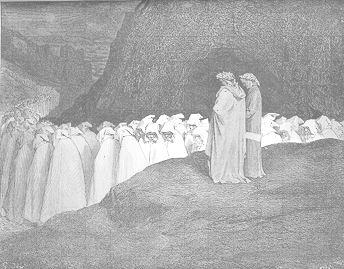|
|
|

| Lasciate ogni speranza voi ch'entrate (Abandon all hope, ye who enter here) | This quote is from Dante's Devine Comedy.
It's referenced in my one of my favorite cartoon series, Exo Squad. Check out the synopsis of the episode in which it's referenced. This episode is one of the last in the series. |
Spanning several years, the epic-like poem The Divine Comedy was written from 1306 to 1321. The poem presents an encyclopedic overview of the attitudes, beliefs, philosophies, as well as the material aspects of the medieval world. Because of these many elements the poem encompasses, The Divine Comedy has become universally known as one of the greatest poems in world literature.
Dante's purpose for writing The Divine Comedy was expressed in a famous letter to his Veronan benefactor, Can Grande della Scala, where he said, "it is an attempt to remove those living in this life from the state of misery and lead them to the state of felicity." Moreover, Dante describes his work as "ploysemous," specifying the principal levels of meaning as both literal and allegorical. In a literal sense, the subject of the poem, according to Dante, is "the state of souls after death." In allegorical terms, the poem is about humankind who by exercising free will will bring "rewarding or punishing justice" upon themselves.
The poem is divided into three sections - - the Inferno, the Purgatorio, and the Paradiso, with the Inferno being the most widely read and studied section of The Divine Comedy. In this segment of the poem, Dante describes a journey through Hell from the entrance at the lowest and less harsh level. His companion for the travel is Vergil, a mentor and protector. Constructed as a huge funnel with nine descending circular ledges, Danteís Hell is a meticulously organized torture chamber in which sinners are carefully categorized according to the nature of their sins. The last level is that of ultimate justice which transforms into merciless retribution and affects the unrepentant. However, those who recognize and repudiate their sins are given a change to purify themselves in Purgatorio, the second of three segments in the poem. Therefore, Dante feels Hell is a necessary, painful first step of any manís spiritual journey.
Through the process of spiritual regeneration and purification, Dante prepares himself to meet God in Paradiso. Through the light of Godís divine truth, the poet hopes to be ultimately rewarded with perfect knowledge. Yet, the poem itself allows the reader to glimpse at this omnipotent knowledge. Dante reflects that the world beyond the present one is, like reality, rational and orderly. The poem allows us to view this certain, orderly world.
La divina commedia (The Divine Comedy) by Dante Alighieri is in no way a comedic literary work. The only term that relates to the poem is "divine." Yet, it is suggested that Dante himself simply called this work "Comedy." This terms holds relevance to the poem when one understands that the poem is a optimistic process from Hell toward Heaven, or from worse to better. This was the basic medieval conception of comedy. The terms "divine" was added later, probably by Boccacio when he continually referred to Dante as a "divine poet." Description from Dante's Clickable Inferno
Find out more about Dante's Inferno at: